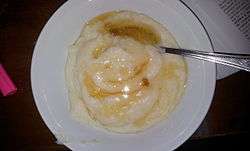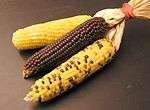Mielie-meal
|
Mealie-Meal for breakfast | |
| Course | breakfast |
|---|---|
| Place of origin | South Africa |
|
| |
Mealie-meal is a relatively coarse flour (much coarser than cornflour or cornstarch) made from maize which is known as mielies[1] or mealies in southern Africa, from the Portuguese milho. The Portuguese had originally brought corn from the Americas to Africa.
It is a food that was originally eaten by the Voortrekkers during The Great Trek, but has become the staple diet of Black Africans, because of its ability to be stored without refrigeration, it is cheap and abundant in all shops and markets. It is a staple food in South Africa,[2] Lesotho, Swaziland, Zambia, Zimbabwe, Malawi, Botswana and many other parts of sub-Saharan Africa, traditionally made into uphuthu, sour-milk porridge, pap, and also Umqombothi (a type of beer).
The raw ingredient of mealie-meal is added to boiling water, the ratio of which produces either porridge[2] or the firmer pap/nshima/sadza. When making porridge milk it is sometimes used to produce a creamier dish, the porridge usually has a thick texture and is commonly eaten for breakfast in Southern Africa. The firmer pap is eaten with the hands with meat and gravy dishes as well as vegetable relishes. It is similar to Italian polenta or American grits except that it is usually made of a white rather than a yellow maize variety.
See also
References
- ↑ Sellick, W. (2010). The Imperial African Cookery Book: Recipes from English-speaking Africa. Jeppestown Press. p. 330. ISBN 978-0-9553936-8-6.
- 1 2 Mwakikagile, G. (2008). South Africa and Its People. New Africa Press. p. 186. ISBN 978-0-9814258-3-2.

